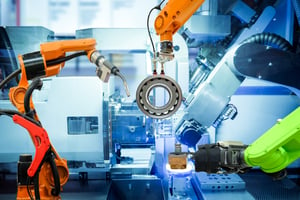In this special blog series, we will review the disruptive technologies being introducing by today’s forward-thinking manufacturers. Over the next few weeks, you’ll learn about the cutting-edge tools transforming the industry and the ways ERP can support their implementation.
The monotonous, the laborious, the dangerous. The range of manufacturing tasks being handled by today’s robots may surprise you. With digital transformation becoming a norm around the globe, the pressure to automate is stronger than ever before, and manufacturers are increasingly turning to robotics to help them streamline processes and lower costs – all while boosting productivity, satisfying customer demand and pursuing continuous innovation. So, how exactly are manufacturers employing robots to achieve these lofty goals?
Disrupting the Supply Chain
Robots are popping up on production floors across the globe but  even the industry’s biggest players have yet to completely automate their operations. Virtually all manufacturers have integrated robots to operate with the oversight and collaboration of human workers – leading to the term “cobot.”
even the industry’s biggest players have yet to completely automate their operations. Virtually all manufacturers have integrated robots to operate with the oversight and collaboration of human workers – leading to the term “cobot.”
For example, the game-changing cobots at Amazon Robotics, formerly Kiva Systems, have made it possible for each Amazon fulfillment center to process up to a million customer orders every 24 hours. By sending a fulfillment robot to locate and fetch a given product, it saves a human miles of walking each day – and saves the company a significant cost.
Robots have proven to be capable of more skilled work, as well. Australian manufacturer Drake Trailers added just one welding robot to its production line and saw a 60 percent increase in productivity. And Cornell Dubilier, a power capacitor manufacturer, now utilizes robots to inspect its capacitor installations. The result? The company has doubled its labeling speed, streamlined its supply chain, and freed up workers for value-added tasks.
Getting There
The benefits of incorporating robotic solutions along the supply chain are clear, but implementing a robotics system is a significant undertaking. Software systems must be in place to inform robots of real-time information like in-stock parts, in-process orders, and current production capacity, especially in the case of discrete manufacturers. Integration with a modern ERP system not only assists in supplying this critical information but also helps manufacturers with forecasting through advanced planning and scheduling capabilities. When used in tandem with ERP, manufacturers can leverage robotics to meet demand and minimize production costs of the orders at hand while optimizing inventory for tomorrow’s customer needs.
Looking Ahead
If the success of today’s robotics-enabled manufacturers tells us anything, it’s that this is one trend with staying power. Companies are getting creative with how they use robotic technology, introducing a real possibility that full automation is feasible in the near future. However, robots can only execute assigned tasks when powered by carefully crafted processes and accurate business intelligence. If you’re looking to get into the robotics game, take stock of your current technologies, including your ERP system, first. Like the rest of your company, even the most advanced of robots require your input to successfully perform their function and benefit your bottom line.
Curious about other tech trends in Manufacturing?
Download our e-book, “Disruptive Manufacturing: 3 Technologies That Will Transform You Operations,” to learn about leading-edge technologies and features emerging in the world of ERP.
Choosing an ERP Consultant
One-size-fits-all is not an option when it comes to ERP systems. The Copley Consulting Group knows there are several factors to determine the right fit for your organization. When working to implement your ERP solution, Copley can provide the technology and support needed for your specific industry and business when choosing between cloud-based or an on-premise ERP. To discuss the right ERP system for your organization, complete our contact form, call us at 855-884-5305, or email us at info@copleycg.com.

